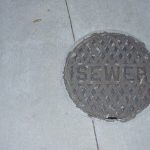The short answer is yes; when the weather turns wetter, it can have a dramatic effect on how your plumbing system performs. This could lead to crawl space of basement flooding in extreme circumstances. In this article, we will look at some of the ways that heavy rain could affect your home plumbing system.
Increased Pressure on Exterior Pipes
Our plumbing systems rely on a network of pipes throughout our homes that ultimately connect to a larger pipe system outdoors. Exterior pipes laid underground may seem safe from pretty much anything, but this isn’t the case. When it rains, the ground can become saturated with water, and as you might expect, this makes the soil heavier. The sand, soil, and dirt turn into mud that will cause an increase in the exterior pressure along your pipes. This can lead to a failure, clogging, and other issues in your home.
Damaged and Blocked Pipes
Heavy periods of rain can have a devastating effect on pipes that already have small cracks or ruptures. The breaks can become larger, and this allows soil and debris to enter the pipe, and blockages can be caused. When a pipe is blocked, the water cannot drain away, and it must go somewhere. This can lead to a backup of water into a crawl space, basement, garage, or other locations with a drain. Blocked pipes can also be caused by root intrusion, which can be encouraged by increased levels of rainfall. The roots sense the presence of water and nutrients, which will attract them naturally to breaks in your underground pipes.
An Overworked Sump Pump
Heavy rain can cause ground saturation. The type of soil around your home will affect what happens next and where the water may travel. If you have permeable ground that is dry most of the time, it’s likely that the water will drain away naturally. But, if the ground is permeable and it’s already saturated with water from previous rainfall, it can build up around the foundations. Gravity will pull water down if you have a home located on an incline, but the water will remain in place if your home is on a flat plane. As the water accumulates, the additional pressure can force it to enter your home via the basement or crawl space. The sump pump draws the water into a sump pit, where a pump is activated to remove the water from the home. But, if the sump pump is poorly maintained or overworked, it can fail, leading to flooding.
Basement or Crawl Space Flooding
When a sump failure, sewer backup, or pipe clog occurs, it can lead to flooding. The risks of this occurrence are increased during periods of heavy rainfall, and it makes good sense to be prepared. Standing water in your home will cause damage to anything stored there, but there are far reaching consequences. The extra moisture can lead to mold growth and attract pests such as rats, mice, and termites. Removing the water with a sump pump or wet-vac should be a priority to mitigate the water damage.
The best way to prepare your plumbing system for heavy rain is to schedule a regular checkup. Contact your local certified plumber and ask them about a health check for your plumbing today.
By Giovanni Longo President Flood Brothers Plumbing
Giovanni Longo is a 3rd generation master plumber who has been practicing his craft and trade in the greater Los Angeles area for well over a decade and a half. A plumbing and hydraulics-engineering innovator, Giovanni’s particular world-class expertise focuses on dealing with challenging sewer system designs as well as resolving complex commercial and residential draining issues. As a certified Flood Mitigation expert, he is also well versed in a wide variety of water damage and remediation solution.





